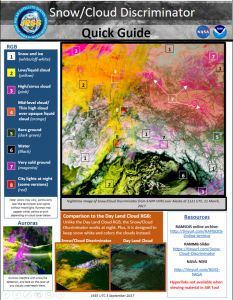The JPSS Program is committed to providing extensive training for the operational and educational communities that will address both the end users’ and developers’ needs, bridging the gap between research and operations. Training will focus on the quantitative and qualitative use of JPSS data and products, methods for interpreting data, new features, capabilities and algorithms, and a better understanding of atmospheric sciences and mesoscale meteorology in preparation for the future JPSS series satellites.
JPSS training is developed and provided by a number of partners across the weather enterprise through the JPSS Proving Ground, e-learning training modules, seminars, weather event simulations, quick guides, and special case studies.

New JPSS Quick Guide CIRA Snow/Cloud Discriminator
The JPSS Proving Ground and Risk Reduction (PGRR) Program
The JPSS Proving Ground and Risk Reduction (PGRR) Program was created in 2011 to facilitate Operations to Operations (O2O) through demonstrations of operational products from the National Environmental Satellite, Data, and Information Service (NESDIS) – derived from JPSS – in NOAA Line Offices (LOs).
The Program focuses on maximizing the benefits and performance of data, algorithms, and products derived from Suomi NPP and JPSS for downstream operational and research users. The PGRR program provides resources and support to peer-reviewed projects which demonstrate improved utilization of JPSS data which enhance NOAA and other agency missions.
PGRR supports:
● Enhancements and improvements of user applications
● Education, Training and Outreach
● Facilitation of transition of improved algorithms to operations.
● User feedback to the calibration/validation (cal/val) program
The Proving Ground component consists of demonstration and utilization of data products by end-users in NOAA’s LOs in their operational and/or research environments, leading to innovative applications and identification of new capabilities. The Proving Ground also promotes outreach, training, and coordination of new products with the end users.

Systems to Services to Stakeholders
The Risk Reduction component focuses on the development of new research and applications to maximize the benefits of JPSS satellite data. It allows for testing alternative algorithms and developing new research and applications as well as the fusion of data/information from multiple satellites, models, and in-situ sources.
User Access to JPSS Training Modules from the U.S. National Weather Service Advanced Weather Interactive Processing System (AWIPS)
NOAA CLC/LMS – http://www.wfm.noaa.gov/e-learning/
NOAA VLAB – https://vlab.ncep.noaa.gov/group/guest/welcome
Non-AWIPS users have access to training modules from several JPSS Training Partners, including:
The Cooperative Program for Operational Meteorology, Education, and Training (COMET) MetEd Program supports, enhances, and stimulates the communication and application of scientific knowledge of the atmospheric and related sciences for the operational and educational communities. The COMET Distance Education Program training materials include web, CD-ROM, and teletraining methods which serve earth science education and training needs by providing interactive experiences for learners at a distance. Please note: You must sign up for an account in order to access the COMET training modules but there is no fee associated with the training resources.
NASA SPoRT: https://weather.msfc.nasa.gov/sport/jpsspg/
WMO-CGMS VIRTUAL LABORATORY FOR EDUCATION AND TRAINING IN SATELLITE METEOROLOGY: https://www.wmo-sat.info/vlab/next-generation-of-satelliles/
Virtual Institute for Satellite Integration Training (VISIT) http://rammb.cira.colostate.edu/training/visit/
Satellite Hydrology and Meteorology (SHyMet) http://rammb.cira.colostate.edu/training/shymet/training_sessions/satfc-j.asp
NOAA CLASS
https://www.class.noaa.gov
Conferences and meetings are also important opportunities to reach the user community and to give the program the chance to communicate with different types of users. The JPSS Program Office participates in and conducts conferences with the user community to keep current with new developments in the program and to assess user readiness. The program also uses these conferences to obtain user feedback; gaining insight from different communities to ensure that user readiness will be achieved. For a list of upcoming conferences and events and to access briefings from past conferences and events, visit http://www.jpss.noaa.gov/events_conferences.html.
The JPSS program has also begun offering “short courses” in conjunction with meteorological conferences and meetings. These courses are designed to introduce users to the capabilities made possible by NOAA’s advanced series of polar-orbiting weather satellites. Planning for additional short courses is underway.
Also, in an effort to promote more frequent communication with the user community about JPSS science and demonstration activities, the JPSS Program provides monthly virtual science seminars. The seminars allow scientists to highlight their recent work to the rest of the community.

